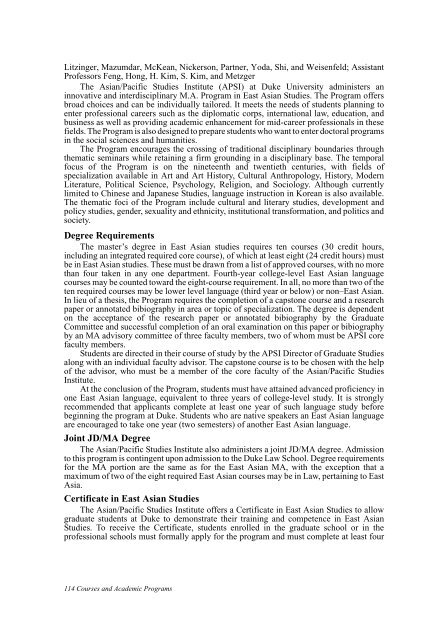2005-06 - Office of the Registrar - Duke University
2005-06 - Office of the Registrar - Duke University
2005-06 - Office of the Registrar - Duke University
You also want an ePaper? Increase the reach of your titles
YUMPU automatically turns print PDFs into web optimized ePapers that Google loves.
Litzinger, Mazumdar, McKean, Nickerson, Partner, Yoda, Shi, and Weisenfeld; Assistant<br />
Pr<strong>of</strong>essors Feng, Hong, H. Kim, S. Kim, and Metzger<br />
The Asian/Pacific Studies Institute (APSI) at <strong>Duke</strong> <strong>University</strong> administers an<br />
innovative and interdisciplinary M.A. Program in East Asian Studies. The Program <strong>of</strong>fers<br />
broad choices and can be individually tailored. It meets <strong>the</strong> needs <strong>of</strong> students planning to<br />
enter pr<strong>of</strong>essional careers such as <strong>the</strong> diplomatic corps, international law, education, and<br />
business as well as providing academic enhancement for mid-career pr<strong>of</strong>essionals in <strong>the</strong>se<br />
fields. The Program is also designed to prepare students who want to enter doctoral programs<br />
in <strong>the</strong> social sciences and humanities.<br />
The Program encourages <strong>the</strong> crossing <strong>of</strong> traditional disciplinary boundaries through<br />
<strong>the</strong>matic seminars while retaining a firm grounding in a disciplinary base. The temporal<br />
focus <strong>of</strong> <strong>the</strong> Program is on <strong>the</strong> nineteenth and twentieth centuries, with fields <strong>of</strong><br />
specialization available in Art and Art History, Cultural Anthropology, History, Modern<br />
Literature, Political Science, Psychology, Religion, and Sociology. Although currently<br />
limited to Chinese and Japanese Studies, language instruction in Korean is also available.<br />
The <strong>the</strong>matic foci <strong>of</strong> <strong>the</strong> Program include cultural and literary studies, development and<br />
policy studies, gender, sexuality and ethnicity, institutional transformation, and politics and<br />
society.<br />
Degree Requirements<br />
The master’s degree in East Asian studies requires ten courses (30 credit hours,<br />
including an integrated required core course), <strong>of</strong> which at least eight (24 credit hours) must<br />
be in East Asian studies. These must be drawn from a list <strong>of</strong> approved courses, with no more<br />
than four taken in any one department. Fourth-year college-level East Asian language<br />
courses may be counted toward <strong>the</strong> eight-course requirement. In all, no more than two <strong>of</strong> <strong>the</strong><br />
ten required courses may be lower level language (third year or below) or non–East Asian.<br />
In lieu <strong>of</strong> a <strong>the</strong>sis, <strong>the</strong> Program requires <strong>the</strong> completion <strong>of</strong> a capstone course and a research<br />
paper or annotated bibiography in area or topic <strong>of</strong> specialization. The degree is dependent<br />
on <strong>the</strong> acceptance <strong>of</strong> <strong>the</strong> research paper or annotated bibiography by <strong>the</strong> Graduate<br />
Committee and successful completion <strong>of</strong> an oral examination on this paper or bibiography<br />
by an MA advisory committee <strong>of</strong> three faculty members, two <strong>of</strong> whom must be APSI core<br />
faculty members.<br />
Students are directed in <strong>the</strong>ir course <strong>of</strong> study by <strong>the</strong> APSI Director <strong>of</strong> Graduate Studies<br />
along with an individual faculty advisor. The capstone course is to be chosen with <strong>the</strong> help<br />
<strong>of</strong> <strong>the</strong> advisor, who must be a member <strong>of</strong> <strong>the</strong> core faculty <strong>of</strong> <strong>the</strong> Asian/Pacific Studies<br />
Institute.<br />
At <strong>the</strong> conclusion <strong>of</strong> <strong>the</strong> Program, students must have attained advanced pr<strong>of</strong>iciency in<br />
one East Asian language, equivalent to three years <strong>of</strong> college-level study. It is strongly<br />
recommended that applicants complete at least one year <strong>of</strong> such language study before<br />
beginning <strong>the</strong> program at <strong>Duke</strong>. Students who are native speakers an East Asian language<br />
are encouraged to take one year (two semesters) <strong>of</strong> ano<strong>the</strong>r East Asian language.<br />
Joint JD/MA Degree<br />
The Asian/Pacific Studies Institute also administers a joint JD/MA degree. Admission<br />
to this program is contingent upon admission to <strong>the</strong> <strong>Duke</strong> Law School. Degree requirements<br />
for <strong>the</strong> MA portion are <strong>the</strong> same as for <strong>the</strong> East Asian MA, with <strong>the</strong> exception that a<br />
maximum <strong>of</strong> two <strong>of</strong> <strong>the</strong> eight required East Asian courses may be in Law, pertaining to East<br />
Asia.<br />
Certificate in East Asian Studies<br />
The Asian/Pacific Studies Institute <strong>of</strong>fers a Certificate in East Asian Studies to allow<br />
graduate students at <strong>Duke</strong> to demonstrate <strong>the</strong>ir training and competence in East Asian<br />
Studies. To receive <strong>the</strong> Certificate, students enrolled in <strong>the</strong> graduate school or in <strong>the</strong><br />
pr<strong>of</strong>essional schools must formally apply for <strong>the</strong> program and must complete at least four<br />
114 Courses and Academic Programs









